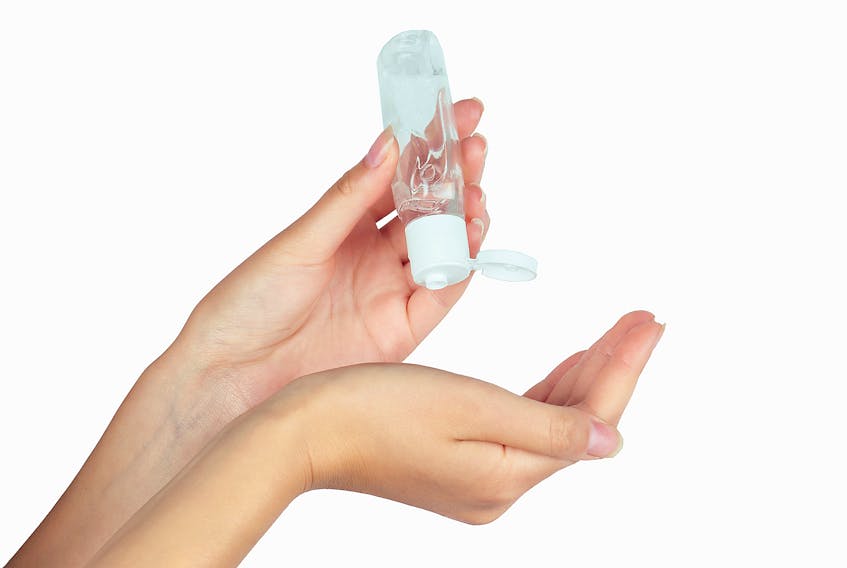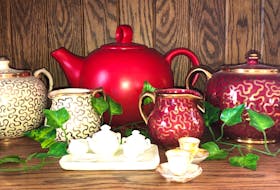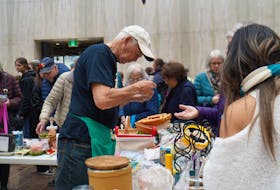During the early days of the pandemic, hundreds of Islanders spent time on the Internet, learning how to make their own hand sanitizer.
An analysis of Google search trend data shows PEI was just behind Newfoundland and Labrador when it came to researching how to make the alcohol-based substance that has since become an integral part of everyday life. Nova Scotia was fourth on the search list behind British Columbia.
Why were East Coasters so interested in a DIY option? A lot comes down to supply and demand last March, as people scrambled to find solutions as lockdowns began and the hunt for commercial hand sanitizer in stores became the quest for the holy grail for many.

DIY or don't?
So, how can you make your own? A website called TheSpruce.com offers a step-by-step guide that is only supposed to take five minutes. It features a recipe that includes just three ingredients - 99 per cent rubbing alcohol or ethanol, aloe vera gel, and essential oil.
Alcohol is the main ingredient and the website explains the purpose of the aloe vera is to prevent the user's hands from drying out. The essential oils (the website suggests thyme or clove oil for fragrance, while lavender or chamomile will work better to soothe the skin) will also help protect against germs, the site claims.
While Dr. Nola Etkin agrees hand sanitizer is not that hard to make, even for those who might be scientifically challenged, the Dean of Science at the University of Prince Edward Island has plenty of questions about the effectiveness of a homemade product - especially when it comes to COVID-19.
While homemade sanitizers (especially those with essential oils) can be very effective in killing harmful bacteria, COVID-19 is a virus, and the ingredients to make a sanitizer that is effective in stopping its spread are not available at the local drugstore.
Etkin says the alcohol - which isn't strong enough to kill the virus, to begin with - becomes even weaker when mixed with the other ingredients in the homemade formula.
"To be sure the sanitizer was effective, you would have to test it soon after production since the ethanol evaporates quickly and, of course, you have no way of doing that at home," she adds.
Additionally, she says, people who make DIY hand sanitizer in a room that is not properly ventilated could put themselves at risk of breathing problems - not to mention the fact alcohol is flammable. But most of all, she feels the biggest danger from homemade production is a false sense of security.
"While killing harmful bacteria is certainly a good thing, it is not protection from COVID-19," she said.

Business pivot
Several Island companies began making hand sanitizer as the pandemic took hold, including Mike Beamish of Deep Roots Distillery in Cornwall, PEI. He decided to use his time in isolation after returning from an out-of-province trip to research how to turn part of his distillery into a commercial operation that would meet Health Canada requirements.
Beamish is a firm believer in the adage that "when life hands you lemons, make lemonade." An apple grower for over 30 years, he turned to distilling when he began looking for ways to use the apples that fell on the ground. It proved too expensive to pasteurize those apples for juice, but if the apples were fermented and distilled to make alcohol, the fallen apples could be used since any bacteria would be killed during the production process.
He looked at sanitizer as a way to replace some of his lost sales on the distillery side. It's worked out so well he's made it a permanent part of his operation. Beamish hopes to expand his sanitizer line to include a gel in the near future.
"I know there were a lot of companies making it at the beginning but I am the last man standing on PEI making it commercially as far as I know," he explained.
Production was a family affair in the early days of the pandemic, as Beamish and his wife Carol got a helping hand from their children Stacey, Greg, and David. Stacey primarily handled the orders and social media, while her brothers concentrated on the production end of the operation, leaving their parents to look after labelling and deliveries.
New niche
"We usually get a fair number of visitors stopping by in the summer to check us out, and it became apparent to me fairly early that wasn't going to happen last year," Beamish explained. "We looked at making sanitizer as a way to make up some of those lost sales."
Beamish continues to sell the sanitizer at his stand at the Charlottetown Farmers' Market, as well as online.
"Many of the people why were buying from us since the beginning are still with us and we have gotten a couple of commercial clients as well," he says.
The secret to making the sanitizer is using the right alcohol, he says. While the Health Canada guidelines suggest 65 to 80 per cent alcohol can be used, Beamish notes the higher amount is recommended, and "that's what we followed from day one."
"The higher the percentage of alcohol, the less amount of time you have to rub your hands to get rid of the bacteria," he noted.
At the start of the pandemic, he said some trouble obtaining the other basic ingredients, notably hydrogen peroxide and glycerin, in large enough quantities. It also proved to be a challenge to find a supplier for the spray and refillable bottles used to package the product.
"We also had to establish a distribution network, as we were set up to market alcohol you drink, not rub on your hands." He jokes, "I was wishing I had paid more attention in high school chemistry class." While the ingredient list is simple, he said the key is making sure the product is blended in the right proportions.
Beamish is convinced the demand for hand sanitizer will remain strong even when the pandemic starts to fade. He's hoping the experience gained over the past several months will allow his company to expand the niche it's carved in the marketplace.
"With what we know right now, it would be relatively easy to increase production quickly in the future if the demand was there," he said.









